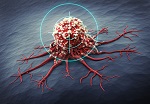
It's incredible that a vaccine for cancer is set for clinical trials. The work is based on a big advancement in cancer treatment called immune checkpoint inhibitors which inhibit cancer cells from escaping the immune system.
Before our body's killer T cells destroy a cell, they check to make sure they're not making a mistake. It does this with a protein called PD-one that acts like a train conductor who checks for valid tickets. Some cancer cells have a valid ticket, called PD-L-one, so they get to stay. But checkpoint inhibitor drugs were developed to block T cells from looking for this ticket which then reveals the cancer cell as an illegal rider.
These drugs are called monoclonal antibodies. They bind to T cells and get the immune system to churn out more antibodies. But a weakness is that monoclonals only block one part of the T-cell protein. There are other parts of the protein that can bind to cancer cells allowing it a pass. This means that there are several conductors on the train and some didn't get the memo that those cancer cell tickets are invalid. That's why the therapy does not work on seventy percent of patients.
But now researchers are testing the polyclonal antibody, a vaccine called PD-one-vaxx. It triggers the body to make antibodies that attach to more than one site on the T cell's PD-one protein so that there's a smaller chance cancer cells can escape. The result of an animal trial was ninety percent effective. And if it works in us, it's a game changer.
More Information
Experimental cancer vaccine passes animal tests, moves to human trials
A novel cancer vaccine is moving to Phase 1 human trials in the United States after promising results from animal studies showed encouraging efficacy and a robust safety profile. A new study describes the vaccine as producing complete responses in 90 percent of animals when combined with a second immunotherapy drug.
Immunogenicity and antitumor efficacy of a novel human PD-1 B-cell vaccine (PD1-Vaxx) and combination immunotherapy with dual trastuzumab/pertuzumab-like HER-2 B-cell epitope vaccines (B-Vaxx) in a syngeneic mouse model
One of the most exciting recent developments in cancer immunotherapy has been the introduction of the immune checkpoint blockade, for which J.P. Alison and T. Honjo received the 2018 Nobel Prize in Physiology and Medicine....
National Cancer Institute: Immune Checkpoint Inhibitors
Immune checkpoints are a normal part of the immune system. Their role is to prevent an immune response from being so strong that it destroys healthy cells in the body...